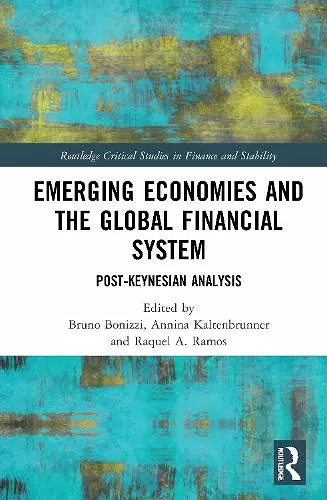Emerging Economies and the Global Financial System
Post-Keynesian Analysis
Bruno Bonizzi editor Annina Kaltenbrunner editor Raquel A Ramos editor
Format:Paperback
Publisher:Taylor & Francis Ltd
Published:9th Jan '23
Currently unavailable, and unfortunately no date known when it will be back
This paperback is available in another edition too:
- Hardback£145.00(9780367111427)

This book provides a comprehensive overview of the financial integration of emerging economies through an in-depth analysis of the international monetary system, how it impacts capital flows and exchange rates, and its implications for policy making.
The financial integration of emerging economies has been a remarkable development of the past two decades. The growth of cross-border transactions and asset ownership, not least through the accumulation of foreign exchange reserves, has put many of these countries in a more prominent, if still peripheral, position within the global financial system. This has not been a smooth process, as integration has been marked by cyclical waves of capital flows, with financial and currency instability often accompanying the acute phases of these cycles. While conventional economic theory traditionally sees financial integration as a positive development, Post-Keynesian economists, working in the tradition of Keynes, Minsky and Kalecki, have long taken a more sceptical viewpoint. By centring the analysis of financial dynamics on concepts as liquidity, uncertainty, balance-sheet structures and institutions, Post-Keynesian theory highlights the intrinsic character of shocks imposed by financial integration upon emerging economies, and their implications for economic growth and distribution. This book demonstrates that these analyses can be fruitfully used to gain a better understanding of financial (in)stability and economic development in emerging economies as they integrate into the global financial system.
This work provides key reading for students and scholars of economics, political economy and finance that are interested in the financial integration of emerging economies, and how the heterodox tradition of Post-Keynesian economics contributes to its analysis.
"Although several theoretical and empirical Post-Keynesian contributions usually recognize the relevance of real factors in the context of small open economies, this book points out in a complementary and virtuously way the importance of financial factors and their relevance for policymakers in the case of trade and financially integrated EMEs. In this vein, the book provides a crystal clear insight into some relevant Post-Keynesian contributions that show the importance of financial integration as a key conceptual device to understand the challenges that EMEs’ governments face in terms of the financial deregulation tendencies experimented through the last decades, the resulting mounting financial instability and its relation to volatile capital gross flows, their negative impact on exchange rates, the notion of monetary sovereignty, and the need of adopting macroprudential policies to control the negative effects of greater financial instability and contribute to exchange rate stability."
Fernando Toledo
Review of Political Economy
ISBN: 9780367700591
Dimensions: unknown
Weight: 120g
278 pages